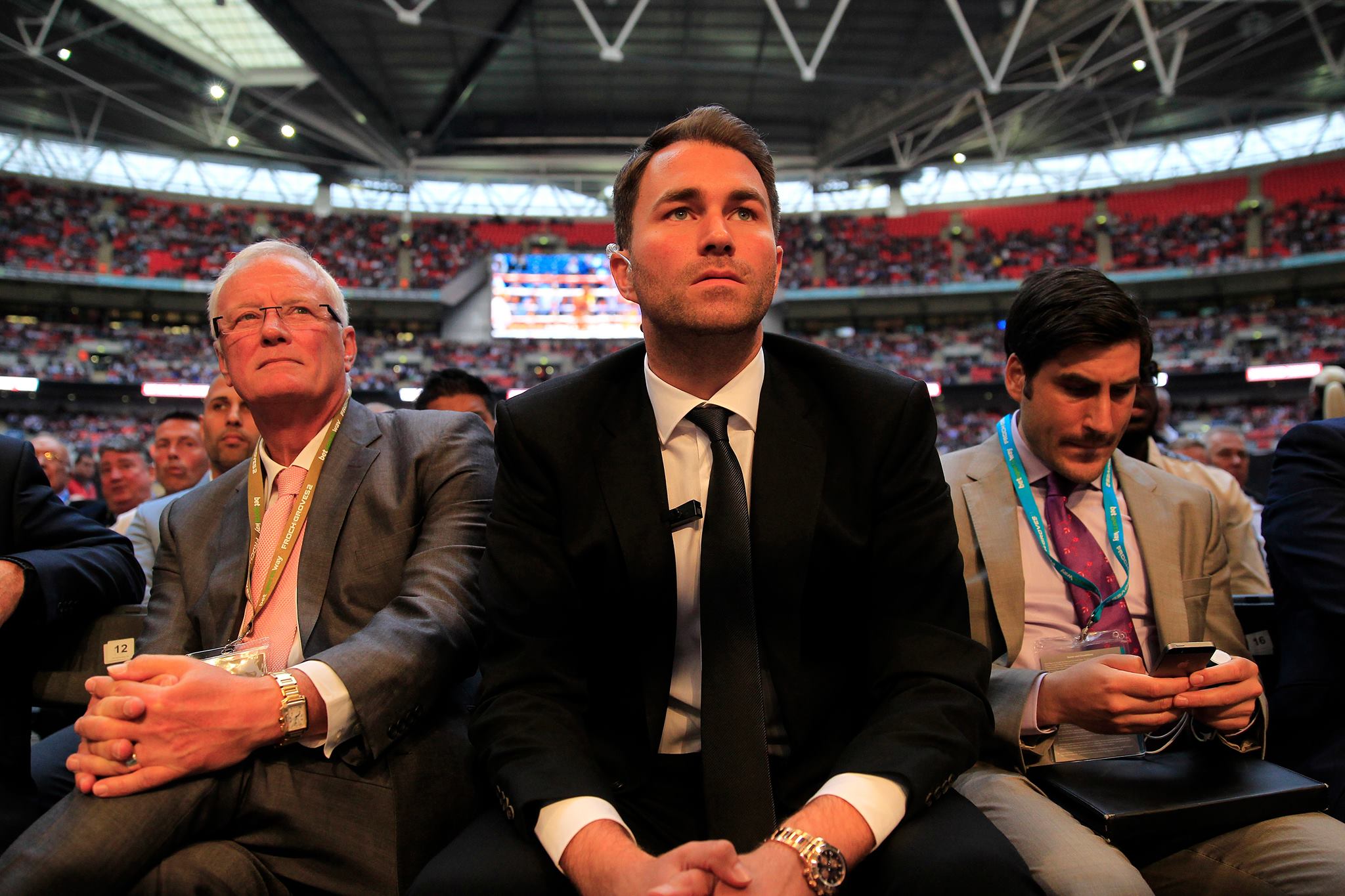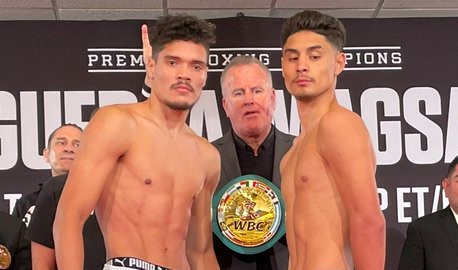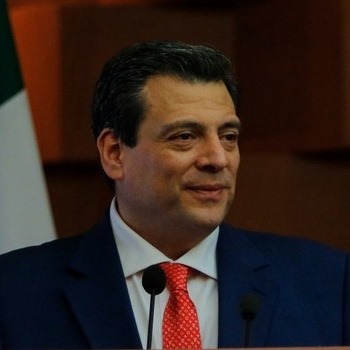Remember this utterance:
“What the (expletive) do I need to be in the back for if I’m (a) manager?”
It’s kind of ironic. When that kind of statement comes out of a promoter’s mouth, it provides justification for the existence of a manager in the first place, doesn’t it?
That was part of the tirade launched by UFC president Dana White against Loretta Hunt, the reporter from another website who chose to pursue a story that explored why managers and agents of fighters in the UFC were being denied credentials giving them access to the dressing room area.
First of all, when you examine it, the statement itself is complete bullshit, and Dana White has to know that, which is probably the reason he instituted that rule to begin with. If I am the manager of a fighter, I am back there if I want to be. Period. Anyone who has been involved in this sport, or boxing for that matter, knows that if somebody has an agenda, there are all kinds of sneaky things that could take place in the dressing room area. And there are things I am there to make sure of…..
Like allowing my guy, OR HIS REPRESENTATIVE, watch the opponent’s hands being taped by his trainer.
Like making sure my guy doesn’t have to have his gloves on too early on the night of the show.
Like making sure my fighter HAS a dressing room in the first place.
Like making sure my fighter has all the things the promoter may be obligated to supply in that dressing room area, whether it be towels, ice, gauze, whatever.
Like making sure I am with my fighter in the event he gets knocked out or otherwise hurt, because some managers care about their charges.
Like making sure some asshole – whether he’s from the UFC or not – isn’t trying to say something to backstab me with my fighter.
Like making sure they’re not trying to make a deal behind my back.
Like making sure somebody isn’t screwing me in some other way.
Managers in the backstage area do not constitute unnecessary traffic. I understand that there are a lot of hangers-on and opportunists who don’t do a thing for some fighters. However, if there is a contract there is a contract. Apparently those who provide representation of fighters constitute something troublesome for the promoter of the show.
Another White quote:
“Hey Loretta, if you’re going to write a story, you (expletive) moron, at least make sure it’s (expletive) true and you have some facts.”
Maybe it’s not as documented as it should be, but has it been proven not to be true? Hasn’t White in fact confirmed that she is on the right track, by his reaction? Loretta’s story seems to make perfect sense to me, all the way down to the quotes from one athletic commissioner, who points out that if a manager wants to apply as a second, he (or she) can. However, short of that, the commission doesn’t have any control over who the promoter gives a pass to, so that is pretty much left up to the UFC’s discretion. I’m not a big fan of entourages, because almost without exception, they are useless. But within the parameters of that discretion, it doesn’t seem unreasonable at all that if an individual has a written agreement for representation with a fighter, that individual could have access.
Knowing that the UFC does not want that to happen – and of course we know that from the quote at the top of this story – should tell you something. Anyone with some experience will tell you that when there is a mechanism in place to separate someone from his “client” in an atmosphere where business is known to be discussed, that is justifiable cause for concern.
Of course, Monte Cox, who was also quoted in Loretta’s piece, has a good point as well, as he said, in so many words, that regarding people talking to his fighters behind his back, he has to be able to trust that the fighter wouldn’t sign anything without him looking at it.
Speaking as someone who has dealt with more fighters than he wants to remember, it does take two to tango, and if a fighter can’t be trusted, he is not worth being involved with. Of course, fighters are also impressionable, and their window of opportunity is not that wide, so it’s not too hard to influence many of them.
Another quote from the White monologue, if you can wade through the dirty words:
“And if you’re going to put some (expletive) quotes in there, get some quotes from some people who at least have the (expletive) (courage) to put their (expletive) name on it.”
This is the quote Loretta Hunt used, from an anonymous source: “They’re divisively trying to split management and fighters. They’re trying to de-power the managers and agents to create a wedge between them.”
I am sure that is true, but that also provides the glitch in the story, which I consider to otherwise be very important. Most of the quotes that provided a gateway for this story to exist, although sounding very credible, nonetheless came from sources that were reticent to identify themselves. As long as fighter representatives don’t want to take a step forward, you can expect that the situation is going to continue, and that is what White and the UFC have to their advantage.
Speaking of not putting someone’s f***ing name on something, have we ever found out who really owned Xyience?
Just a thought.



















LarryFex
06/25/2024 at 4:42 am
pin up 306: pin up apk yukle – pin up azerbaycan
AlbertImipt
06/25/2024 at 5:03 am
pin up casino azerbaycan https://azerbaijancuisine.com/# pin-up 141
pin up
Richardled
06/26/2024 at 8:36 am
mexico drug stores pharmacies [url=https://northern-doctors.org/#]northern doctors[/url] mexico drug stores pharmacies
Williamfrumn
06/26/2024 at 8:55 am
purple pharmacy mexico price list: mexican pharmacy online – medicine in mexico pharmacies
Williamfrumn
06/26/2024 at 2:10 pm
medicine in mexico pharmacies: mexican northern doctors – medicine in mexico pharmacies
Richardled
06/26/2024 at 4:10 pm
mexican drugstore online [url=https://northern-doctors.org/#]medicine in mexico pharmacies[/url] medication from mexico pharmacy
Williamfrumn
06/26/2024 at 4:31 pm
mexican border pharmacies shipping to usa: northern doctors pharmacy – mexican pharmacy
Williamfrumn
06/26/2024 at 6:20 pm
mexican pharmacy: mexican pharmacy online – mexican online pharmacies prescription drugs
Williamfrumn
06/26/2024 at 8:12 pm
п»їbest mexican online pharmacies: northern doctors – reputable mexican pharmacies online
Williamfrumn
06/26/2024 at 10:06 pm
medication from mexico pharmacy: mexican northern doctors – mexico drug stores pharmacies
Richardled
06/26/2024 at 10:31 pm
medication from mexico pharmacy [url=http://northern-doctors.org/#]mexican northern doctors[/url] buying from online mexican pharmacy
Williamfrumn
06/26/2024 at 11:56 pm
medication from mexico pharmacy: mexican northern doctors – medication from mexico pharmacy
Williamfrumn
06/27/2024 at 1:50 am
buying prescription drugs in mexico online: mexican pharmacy – mexico drug stores pharmacies
Williamfrumn
06/27/2024 at 3:42 am
mexico drug stores pharmacies: northern doctors – best online pharmacies in mexico
Williamfrumn
06/27/2024 at 5:32 am
medicine in mexico pharmacies: northern doctors pharmacy – п»їbest mexican online pharmacies
Williamfrumn
06/27/2024 at 7:22 am
mexican online pharmacies prescription drugs: mexican pharmacy online – mexican mail order pharmacies
Williamfrumn
06/27/2024 at 9:14 am
mexican online pharmacies prescription drugs: northern doctors pharmacy – mexican drugstore online
Williamfrumn
06/27/2024 at 11:26 am
mexican pharmaceuticals online: mexican pharmacy – buying prescription drugs in mexico
Richardled
06/27/2024 at 5:14 pm
mexican border pharmacies shipping to usa [url=http://northern-doctors.org/#]northern doctors[/url] buying from online mexican pharmacy
JeffreyMok
06/27/2024 at 5:54 pm
https://northern-doctors.org/# buying from online mexican pharmacy
Williamfrumn
06/27/2024 at 6:14 pm
buying from online mexican pharmacy: mexican pharmacy online – mexican border pharmacies shipping to usa
Williamfrumn
06/27/2024 at 7:53 pm
mexican border pharmacies shipping to usa: pharmacies in mexico that ship to usa – medication from mexico pharmacy
Williamfrumn
06/27/2024 at 11:19 pm
п»їbest mexican online pharmacies: mexican pharmacy northern doctors – reputable mexican pharmacies online
Williamfrumn
06/28/2024 at 12:59 am
mexican pharmacy: Mexico pharmacy that ship to usa – mexican rx online
Richardled
06/28/2024 at 1:59 am
buying prescription drugs in mexico online [url=https://northern-doctors.org/#]Mexico pharmacy that ship to usa[/url] best online pharmacies in mexico
Williamfrumn
06/28/2024 at 4:09 am
mexican online pharmacies prescription drugs: northern doctors pharmacy – mexican mail order pharmacies
Williamfrumn
06/28/2024 at 7:20 am
purple pharmacy mexico price list: mexican northern doctors – medicine in mexico pharmacies
Williamfrumn
06/28/2024 at 8:58 am
buying from online mexican pharmacy: northern doctors – mexican drugstore online
JeffreyMok
06/28/2024 at 9:36 am
http://northern-doctors.org/# buying from online mexican pharmacy
Williamfrumn
06/28/2024 at 10:38 am
pharmacies in mexico that ship to usa: mexican northern doctors – buying prescription drugs in mexico online
Richardled
06/28/2024 at 10:57 am
mexican rx online [url=https://northern-doctors.org/#]mexican pharmacy northern doctors[/url] mexico drug stores pharmacies
Williamfrumn
06/28/2024 at 12:18 pm
mexico pharmacies prescription drugs: buying from online mexican pharmacy – medication from mexico pharmacy
JeffreyMok
06/28/2024 at 12:19 pm
https://northern-doctors.org/# mexico pharmacy
Williamfrumn
06/28/2024 at 1:54 pm
п»їbest mexican online pharmacies: northern doctors pharmacy – mexican mail order pharmacies
Williamfrumn
06/28/2024 at 3:36 pm
buying prescription drugs in mexico: northern doctors pharmacy – pharmacies in mexico that ship to usa
Williamfrumn
06/28/2024 at 5:21 pm
buying from online mexican pharmacy: northern doctors pharmacy – reputable mexican pharmacies online
JeffreyMok
06/28/2024 at 5:44 pm
https://northern-doctors.org/# mexico drug stores pharmacies
Williamfrumn
06/28/2024 at 7:03 pm
mexican mail order pharmacies: mexican pharmacy – pharmacies in mexico that ship to usa
Richardled
06/28/2024 at 8:01 pm
best online pharmacies in mexico [url=http://northern-doctors.org/#]northern doctors pharmacy[/url] medicine in mexico pharmacies
Williamfrumn
06/28/2024 at 10:23 pm
mexico pharmacy: northern doctors pharmacy – buying from online mexican pharmacy
Williamfrumn
06/28/2024 at 11:59 pm
mexico drug stores pharmacies: northern doctors – mexican mail order pharmacies
Ronnienop
06/29/2024 at 2:23 am
purple pharmacy mexico price list [url=https://cmqpharma.online/#]cmqpharma.com[/url] mexico drug stores pharmacies
Jeffreyber
06/29/2024 at 3:35 am
http://cmqpharma.com/# medication from mexico pharmacy
mexican online pharmacies prescription drugs
Stephenrhype
06/29/2024 at 4:58 pm
buying prescription drugs in mexico online: cmq pharma – purple pharmacy mexico price list
Ronnienop
06/29/2024 at 10:44 pm
mexico pharmacy [url=https://cmqpharma.online/#]cmq pharma[/url] mexican pharmaceuticals online
Ronnienop
06/30/2024 at 1:28 am
mexican rx online [url=https://cmqpharma.com/#]mexican online pharmacy[/url] п»їbest mexican online pharmacies
Ronnienop
07/02/2024 at 2:22 am
mexico drug stores pharmacies [url=https://cmqpharma.online/#]cmqpharma.com[/url] pharmacies in mexico that ship to usa
IrvinErync
07/09/2024 at 1:03 am
buying prescription drugs in mexico: buying prescription drugs in mexico online – buying prescription drugs in mexico online
RodolfoRal
07/09/2024 at 2:34 am
pharmacies in mexico that ship to usa
http://cmqpharma.com/# medication from mexico pharmacy
mexican online pharmacies prescription drugs
Michaelmoolo
07/19/2024 at 10:12 pm
Online medicine order: pharmacy website india – best online pharmacy india
CharlesRor
07/19/2024 at 10:38 pm
canadian pharmacy 365 [url=https://canadapharmast.com/#]legit canadian pharmacy online[/url] canadian pharmacy drugs online
Davidtoows
07/19/2024 at 11:08 pm
buy medicines online in india: cheapest online pharmacy india – pharmacy website india
Davidtoows
07/20/2024 at 12:21 am
canadian pharmacy 365: buy canadian drugs – canadapharmacyonline com
Michaelmoolo
07/20/2024 at 12:44 am
canada ed drugs: canadian pharmacy no rx needed – canadian pharmacy near me
EdwardLoobe
07/20/2024 at 1:02 am
http://canadapharmast.com/# reliable canadian pharmacy
Davidtoows
07/20/2024 at 4:18 am
pharmacies in mexico that ship to usa: mexican drugstore online – mexico pharmacies prescription drugs
Davidtoows
07/20/2024 at 5:26 am
cheapest online pharmacy india: buy prescription drugs from india – cheapest online pharmacy india
CharlesRor
07/20/2024 at 5:32 am
canadian drug pharmacy [url=http://canadapharmast.com/#]canada pharmacy online[/url] canadian online drugstore
Michaelmoolo
07/20/2024 at 6:49 am
canada pharmacy reviews: canadian pharmacy near me – safe canadian pharmacy
Davidtoows
07/20/2024 at 9:12 am
best online pharmacies in mexico: mexican pharmacy – mexico pharmacies prescription drugs
Michaelmoolo
07/20/2024 at 9:37 am
mexico pharmacy: mexico pharmacy – purple pharmacy mexico price list
Davidtoows
07/20/2024 at 10:22 am
medicine in mexico pharmacies: mexico pharmacies prescription drugs – medicine in mexico pharmacies
EdwardLoobe
07/20/2024 at 1:32 pm
https://canadapharmast.online/# canadian pharmacy meds reviews
CharlesRor
07/20/2024 at 3:40 pm
india pharmacy mail order [url=http://indiapharmast.com/#]indian pharmacy[/url] indian pharmacy paypal
Davidtoows
07/20/2024 at 4:15 pm
buying prescription drugs in mexico online: mexico drug stores pharmacies – mexican drugstore online
Michaelmoolo
07/20/2024 at 4:20 pm
pharmacy website india: buy medicines online in india – Online medicine home delivery
Michaelmoolo
07/20/2024 at 7:00 pm
pharmacy website india: п»їlegitimate online pharmacies india – buy prescription drugs from india
Davidtoows
07/20/2024 at 7:57 pm
best online pharmacies in mexico: medicine in mexico pharmacies – mexican pharmaceuticals online
EdwardLoobe
07/21/2024 at 12:37 am
https://indiapharmast.com/# Online medicine order
Michaelmoolo
07/21/2024 at 1:07 am
п»їbest mexican online pharmacies: mexico pharmacies prescription drugs – reputable mexican pharmacies online
CharlesRor
07/21/2024 at 1:27 am
medicine in mexico pharmacies [url=http://foruspharma.com/#]reputable mexican pharmacies online[/url] mexico drug stores pharmacies
Davidtoows
07/21/2024 at 2:23 am
canadianpharmacymeds: safe canadian pharmacies – canadian pharmacy tampa
Michaelmoolo
07/21/2024 at 3:56 am
indian pharmacy paypal: top online pharmacy india – indianpharmacy com
Davidtoows
07/21/2024 at 6:12 am
world pharmacy india: india online pharmacy – india pharmacy
Davidtoows
07/21/2024 at 7:17 am
online canadian drugstore: canada rx pharmacy – canadian pharmacy 365
Myronnepay
07/21/2024 at 1:50 pm
http://ciprodelivery.pro/# purchase cipro
buy clomid [url=http://clomiddelivery.pro/#]cost of cheap clomid pill[/url] where buy clomid no prescription
Thomaskef
07/21/2024 at 3:33 pm
https://clomiddelivery.pro/# where buy generic clomid price
Jamesjam
07/21/2024 at 3:50 pm
doxycycline 20 mg capsules: buy doxycycline canada – doxycycline capsule price
Myronnepay
07/21/2024 at 6:35 pm
https://ciprodelivery.pro/# cipro
buy generic ciprofloxacin [url=https://ciprodelivery.pro/#]ciprofloxacin over the counter[/url] buy cipro online
Myronnepay
07/21/2024 at 11:28 pm
http://ciprodelivery.pro/# buy generic ciprofloxacin
amoxicillin 30 capsules price [url=http://amoxildelivery.pro/#]amoxicillin for sale online[/url] amoxicillin without a prescription
Thomaskef
07/21/2024 at 11:33 pm
https://paxloviddelivery.pro/# paxlovid pill
Myronnepay
07/22/2024 at 3:46 am
http://amoxildelivery.pro/# amoxicillin generic
where can i get generic clomid now [url=http://clomiddelivery.pro/#]can i purchase cheap clomid without rx[/url] where to get generic clomid pill
Jamesjam
07/22/2024 at 4:37 am
amoxicillin 750 mg price: amoxicillin in india – how to buy amoxycillin
Thomaskef
07/22/2024 at 7:35 am
http://amoxildelivery.pro/# how much is amoxicillin prescription
Myronnepay
07/22/2024 at 8:47 am
http://doxycyclinedelivery.pro/# doxycycline tablet
amoxicillin order online no prescription [url=http://amoxildelivery.pro/#]amoxicillin 500 mg[/url] buy amoxicillin over the counter uk
Myronnepay
07/22/2024 at 1:14 pm
https://clomiddelivery.pro/# how can i get generic clomid price
cheap clomid without rx [url=https://clomiddelivery.pro/#]can you buy generic clomid pill[/url] can you get cheap clomid price
Thomaskef
07/22/2024 at 3:38 pm
http://doxycyclinedelivery.pro/# cost of doxycycline canada
Jamesjam
07/22/2024 at 5:08 pm
cost generic clomid without insurance: can i order cheap clomid pills – where to get cheap clomid prices
Myronnepay
07/22/2024 at 6:30 pm
http://clomiddelivery.pro/# can you get generic clomid without dr prescription
paxlovid covid [url=https://paxloviddelivery.pro/#]paxlovid price[/url] paxlovid pill
Myronnepay
07/22/2024 at 10:42 pm
https://ciprodelivery.pro/# ciprofloxacin order online
doxycycline online with no prescription [url=http://doxycyclinedelivery.pro/#]doxycycline 100mg capsule sale[/url] 10 mg doxycycline
Thomaskef
07/22/2024 at 11:27 pm
https://ciprodelivery.pro/# buy cipro
Myronnepay
07/23/2024 at 3:40 am
https://doxycyclinedelivery.pro/# doxycycline antimalarial
doxycycline minocycline [url=http://doxycyclinedelivery.pro/#]doxycycline order online[/url] doxycycline capsule 100mg price
Jamesjam
07/23/2024 at 5:51 am
can you buy clomid prices: clomid for sale – buying generic clomid without prescription
Thomaskef
07/23/2024 at 6:55 am
https://doxycyclinedelivery.pro/# order doxycycline capsules online
Myronnepay
07/23/2024 at 7:58 am
http://paxloviddelivery.pro/# paxlovid price
generic clomid without a prescription [url=https://clomiddelivery.pro/#]can i order cheap clomid for sale[/url] can i order generic clomid without a prescription
Myronnepay
07/23/2024 at 1:01 pm
http://paxloviddelivery.pro/# paxlovid cost without insurance
can i buy amoxicillin over the counter [url=http://amoxildelivery.pro/#]amoxicillin 500 tablet[/url] amoxicillin 500mg buy online canada
Thomaskef
07/23/2024 at 1:54 pm
https://doxycyclinedelivery.pro/# doxycycline 100 mg pill
Myronnepay
07/23/2024 at 5:28 pm
http://clomiddelivery.pro/# where can i get cheap clomid for sale
where to get clomid prices [url=http://clomiddelivery.pro/#]get generic clomid without prescription[/url] can i buy generic clomid without insurance
Jamesjam
07/23/2024 at 6:31 pm
generic doxycycline: doxycycline nz – can i buy doxycycline online
Thomaskef
07/23/2024 at 10:05 pm
http://amoxildelivery.pro/# can you buy amoxicillin uk
Myronnepay
07/23/2024 at 10:48 pm
http://clomiddelivery.pro/# can i order generic clomid no prescription
where can i get generic clomid without a prescription [url=https://clomiddelivery.pro/#]cost of generic clomid pills[/url] can i get generic clomid without a prescription
Myronnepay
07/24/2024 at 3:09 am
http://doxycyclinedelivery.pro/# doxycycline 500mg price in india
п»їcipro generic [url=http://ciprodelivery.pro/#]where can i buy cipro online[/url] ciprofloxacin 500 mg tablet price
Thomaskef
07/24/2024 at 6:28 am
https://clomiddelivery.pro/# can i get generic clomid
Jamesjam
07/24/2024 at 7:22 am
ciprofloxacin 500mg buy online: buy cipro online canada – buy cipro online canada
Myronnepay
07/24/2024 at 8:16 am
https://doxycyclinedelivery.pro/# 100mg doxycycline
paxlovid covid [url=http://paxloviddelivery.pro/#]paxlovid cost without insurance[/url] paxlovid price
Jamesjam
07/24/2024 at 7:57 pm
doxycycline 200: doxycycline 120mg – cost doxycycline australia